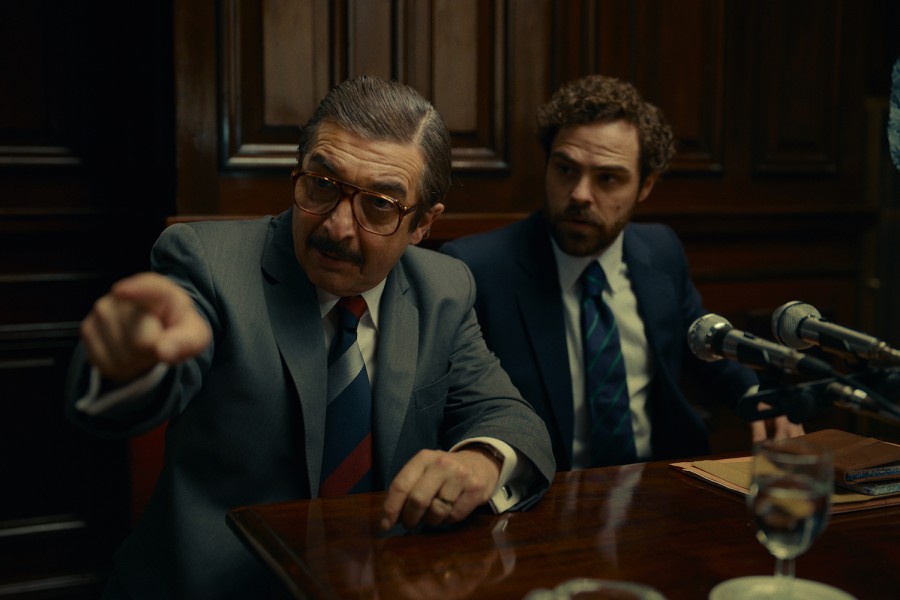Review: ‘Argentina, 1985’ and the legacy of a landmark anti-fascist trial
Nominated for best international feature film, Santiago Mitre’s “Argentina, 1985” depicts a monumental event in Argentine and international legal history. The film is showing in select theaters and streaming on Amazon Prime.
March 7, 2023
In “Argentina, 1985” director Santiago Mitre captures a rare moment in global history — the successful civilian persecution of a tyrannical government. Nominated for best international feature film at the Academy Awards, Mitre’s emotionally charged courtroom drama is a dramatization of Argentina’s infamous Juicio a las Juntas Militares (Trial of the Juntas)
After the Dirty War — a nine-year campaign of terror against leftist groups in Argentine society — a team of young lawyers led by chief prosecutor Julio César Strassera (Ricardo Darín) relentlessly fought for the incarceration of the military junta. Along with the more recent release of “El Juicio,” Ulises de la Orden’s documentary on the same topic, at the Berlin International Film Festival, Mitre’s film puts a spotlight on a watershed moment in Argentina’s history. The cinematic portrayal of these events immortalizes a legacy of civilians overcoming dictatorship, upholding democratic institutions and resisting fascism.
“Argentina, 1985” is presented as a simple and predictable narrative; it carries out all the tried and tested beats of a legal drama. The crime is established, the attorneys are called, they gather evidence and they present their case. However, shocking narrative subversion and complexity are not needed to tackle the raw, emotive power of this historical event. In an interview with The Hollywood Reporter, Mitre said that, given the significance of the trial in his country’s history, he was “surprised that it was not shot before,” and thought that the film has become a lot more relevant now than it was when he first set out to make it.
In times of political instability and social division, “Argentina, 1985” is a call to arms for the everyman to stand up to seemingly insurmountable hierarchies. Without the people’s participation in democratic institutions and their active resistance against malicious forces, Argentina will inevitably slip back into subjugation.
Mitre’s visceral realization of the trial hinges on building a relatable emotional core to an abstract struggle that many international viewers have no connection to. Through the charged performances of a talented cast, the film instantly captivates audiences, bringing them into the volatile world of 1980s Argentina.
Darín, who also produced the film, plays Strassera, as a man torn between moral duty and fear. He despises the generals for their brutal conduct, but confronting this dark past puts his family in a dangerous position. On the other hand, Strassera’s ambitious assistant prosecutor, Luis Moreno Ocampo (Peter Lanzani), feels the need to vindicate himself to his family, who are staunch supporters of the military junta. Coming from an upper-class military family, Ocampo becomes the target of stalking and threats by agents who seek to influence the outcome of the proceedings. The members of the prosecution work under intense pressure and paranoia; they are beset by the shadows of secret police units and other agents loyal to dictator Jorge Rafael Videla’s junta.
The other half of the film’s emotional core is the group of heart-wrenching testimonies, delivered by the victims of the old regime. One by one, they sit before the judges to relive an unimaginable trauma of extralegal detainment, torture and sexual abuse. Most notably, Laura Paredes plays Adriana Calvo, a physicist and activist who was the first to testify in the trial. In the film, Calvo reveals the inhumane treatment she experienced when she was detained during her pregnancy.
While nothing can heal the trauma they experienced or bring back loved ones who disappeared, the film ensures that audiences around the world will never forget the heinous crimes committed during this dark period in history. Though it tackles a specific chapter in Argentine history, the film has resonated with groups in many countries, especially in other parts of Latin America, which also share recent histories of brutal autocracy. Unlike Argentina, many nations have not had the same opportunity to achieve closure and national healing. Instead, the ghosts of their tyrannical past continue to creep through the political system. Like Strassera’s closing argument, the film declares, “Nunca Más!” (Never Again), cautioning all towards the innumerable human costs of authoritarianism.
Contact Mick Gaw at [email protected].

























































































































































